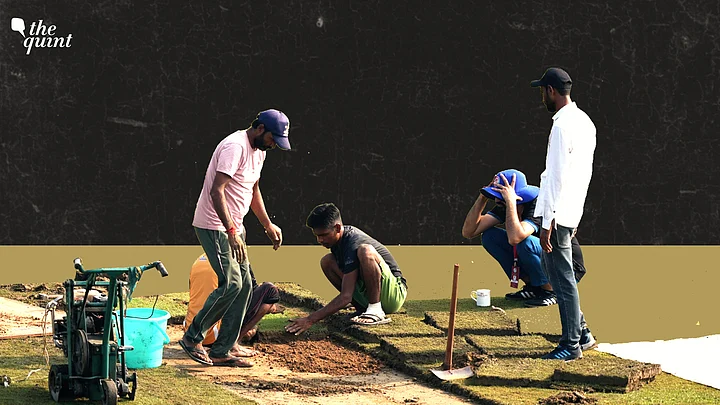India is now the undisputed leader of world cricket. It has been in this position for more than two decades. But the powers that be of the sport have never really leveraged their leadership like they are trying to do in recent times.
Hence the decision a few years ago to allow Afghanistan to make India as one of its ‘home’ bases was a laudable one. But over the years, this move has not really paid dividends for India like most expected it to.
Take the example of the recent Greater Noida Test between Afghanistan and New Zealand which was completely washed out without a ball being bowled.
This Test was meant to showcase India’s might as a cricket powerhouse and show the world the number of new venues that have sprung up over the years.
Yet, the poor quality of the stadium in Greater Noida, the absolute shambolic procedures used to dry the wet ground, and the poor drainage facility presented a shameful picture of India to the whole world.
The Afghanistan Cricket Board (ACB), technically the host of the Test, were left red-faced. But, more importantly, this whole thing was a poor advert for India as a 'host' nation.
While everyone, including the powers that be at the Wankhede Stadium in Mumbai will try to wash their hands (quite literally) off this issue, there is a bigger game at play here.
Greater Ownership Over a Hands Off Approach
There is a lot more than India needs to be doing than just handing over a venue to Afghanistan for their home matches. The board should have insisted on the ACB picking a proper state association venue as their home base rather than a random ground in Greater Noida.
Anything that happens at any ground in India will be seen from the prism of the might of the country in the sport rather than in the technicalities of who owns the ground and who does not. The sight of fans being brought in, and grass being cut and pasted was pitiable to say the least. These could clearly have been avoided if the Board had told the ACB very clearly that the ground is not linked to any state association.
If every form of cricket that happens in India is linked to the Board or its affiliated units, why was this ground in Greater Noida allowed to walk away with the bragging and hosting rights? There needs to be greater ownership of the game than this hands off approach that we saw in this whole matter.
After all, if any cricket is held in Australia, England or New Zealand or any of the major nations, the Board of that country takes ownership and control of the game.
All cricket and all forms of cricket needs to be under one umbrella that is the BCCI. We cannot let the game be taken for a ride under the garb of technicalities. While the whole allocation of the home base and its usage by the ACB is purely a commercial initiative, there needs to be greater control of the whole process.
Cricket: India's Soft Power
We have seen some recent moves by the Board to allow Nepal to use the National Cricket Academy (NCA) for training purposes. That was a good move, but India has not done more of this kind over the years. The Board needs to follow the Australian and English model in befriending the associate cricket nations in the region. The Australian and English boards allow teams around them to play, train regularly. Until a few years ago Scotland, Ireland and even The Netherlands were allowed to play a domestic competition in England. For Australia, cricket is a great diplomatic tool in keeping the Pacific nations in its fold. Cricket Australia (CA) regularly provides coaches, grounds and training facilities to their nearby nations.
India should have jumped on this bandwagon a long time ago. Afghanistan players were first employed in the Indian Premier League (IPL) only in the past decade. A lot more can be done to have more associate country players being picked or involved in the IPL. Nepal’s disgraced spinner Sandeep Lamichchane was a rare pick by a franchise, but that did not last long.
Cricket provides India a soft power much like movies and a lot more can be done by the Board to leverage this. If you do a straw poll, you will find that most associate cricket nations are made up of players with Indian or Pakistani origin. India can certainly use this fact as an advantage in trying to push its diplomatic messages through.
Hence having this hands-off attitude with regards to the Afghanistan home base is certainly not a good sign. The Board needs to open the doors to a lot more teams in the region than it does currently.
Make India the true home of cricket and move it from the West in every sense of the word. India is already the financial muscle of the sport, but now it also needs to be the spiritual home.
For that India’s grounds need to be world class. Just massive structures with no facilities to get it in shape after a downpour is not good enough. India needs to step up its game in every sense of the word. If India is dreaming about hosting the 2036 Olympics, the time to showcase the country as a destination for sport needs to start now.
